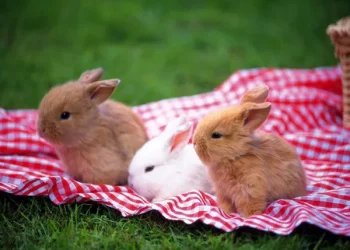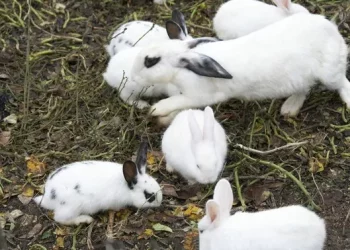Rabbits are popular pets known for their gentle nature and playful behavior. As a senior veterinarian, I often field questions from rabbit owners seeking to provide the best nutrition for their furry companions. One common query is about suitable high-protein snacks for rabbits. Protein is a crucial nutrient for rabbits, influencing their overall health, growth, and well-being. This article will explore the role of protein in a rabbit’s diet, examine various high-protein snack options, and provide guidance on how to incorporate these snacks into your rabbit’s diet safely and effectively.
The Role of Protein in a Rabbit’s Diet
Before delving into specific snacks, it is important to understand why protein is vital for rabbits.
Protein Requirements
Rabbits are herbivores with a unique digestive system adapted to a diet primarily composed of fibrous plant material. However, protein is still an essential nutrient for rabbits, contributing to various physiological functions:
Growth and Development: Protein is necessary for the growth and development of young rabbits. It supports muscle development and overall body growth.
Maintenance of Body Functions: In adult rabbits, protein is vital for maintaining body functions, including immune system health, skin and coat condition, and cell repair.
Reproduction: For breeding rabbits, adequate protein is important for reproductive health and the development of offspring.
Protein Sources
In a rabbit’s diet, protein should come from high-quality sources. While commercial rabbit food typically contains sufficient protein, additional snacks can provide variety and enrichment. It is crucial, however, to balance protein intake with other dietary components such as fiber, vitamins, and minerals.
Understanding Rabbit Nutritional Needs
To select appropriate high-protein snacks, one must first understand the nutritional needs of rabbits.
Nutritional Balance
Rabbits have specific dietary requirements that must be met to ensure their health:
Fiber: High fiber content is essential for healthy digestion and preventing gastrointestinal problems. Timothy hay, meadow hay, and other high-fiber hays should make up the majority of a rabbit’s diet.
Protein: Adult rabbits generally need around 12-16% protein in their diet. Young rabbits and lactating females may require slightly higher levels.
Vitamins and Minerals: A balanced diet also includes necessary vitamins and minerals, which are typically provided through a combination of hay, vegetables, and commercial pellets.
Risks of Excess Protein
While protein is essential, excessive amounts can lead to health issues such as kidney stress or obesity. It is important to provide protein snacks in moderation and ensure they do not disrupt the overall nutritional balance of the rabbit’s diet.
High-Protein Snack Options for Rabbits
Several high-protein snacks can be safely incorporated into a rabbit’s diet. It’s important to offer these snacks in moderation and as part of a balanced diet.
Commercial Rabbit Treats
Many pet stores offer commercial rabbit treats designed to meet their nutritional needs. These treats can be a convenient source of protein.
Types of Commercial Treats
Protein-Rich Nuggets: These are specially formulated treats that contain high levels of protein and other essential nutrients.
High-Protein Hay Cubes: Some products come in the form of compressed hay cubes enriched with additional protein.
Selection Tips
Check Ingredients: Look for treats with high-quality ingredients and avoid those with added sugars, artificial colors, or preservatives.
Moderation: Follow the recommended feeding guidelines on the packaging to prevent overfeeding.
Fresh Vegetables
Certain fresh vegetables can be a good source of protein and other nutrients.
Protein-Rich Vegetables
Kale: Kale is high in protein and also provides vitamins A, C, and K.
Spinach: Spinach contains protein and a range of vitamins and minerals. However, it should be fed in moderation due to its high oxalate content.
Parsley: Parsley is another herb that offers a decent amount of protein along with vitamins and antioxidants.
Feeding Guidelines
Variety: Offer a variety of vegetables to ensure a well-rounded diet.
Portion Control: Introduce new vegetables gradually and monitor for any digestive issues.
High-Protein Hay
In addition to fresh vegetables, certain types of hay can provide additional protein.
Types of Hay
Alfalfa Hay: Alfalfa hay is higher in protein compared to timothy or meadow hay and is suitable for young rabbits or pregnant females. However, it is too rich for adult rabbits and can lead to obesity or kidney problems if fed in excess.
Clover Hay: Clover hay also contains higher protein levels and can be given as a supplement to a rabbit’s diet.
Use of Hay
Supplement: Use high-protein hay as a supplement rather than a primary food source.
Mixing: Mix with lower-protein hays like timothy or meadow hay to balance the diet.
Nuts and Seeds
Some nuts and seeds can be high in protein, but they should be offered sparingly.
Protein-Rich Nuts and Seeds
Sunflower Seeds: These are high in protein but also high in fat. Offer in small quantities as an occasional treat.
Pumpkin Seeds: Pumpkin seeds are another option but should be given in moderation due to their fat content.
Feeding Guidelines
Small Quantities: Due to their high fat content, nuts and seeds should be a small part of the diet.
Avoid Salt and Seasoning: Ensure that any nuts or seeds offered are plain and unsalted.
Homemade Treats
Homemade treats can be a great way to provide high-protein snacks tailored to your rabbit’s needs.
Recipe Ideas
Dried Fruit and Herb Mix: Combine dried fruits like apples (without seeds) with herbs such as dill or basil.
Vegetable and Herb Balls: Create small balls using finely chopped vegetables and herbs mixed with a bit of high-fiber hay.
See Also: How Do Rabbits Like to Sleep?
Preparation Tips
Avoid Harmful Ingredients: Ensure all ingredients are safe for rabbits and free from additives.
Portion Size: Keep portions small to avoid overfeeding and maintain a balanced diet.
Implementing High-Protein Snacks in Your Rabbit’s Diet
Incorporating high-protein snacks into your rabbit’s diet requires careful planning to maintain nutritional balance.
Guidelines for Offering Snacks
Moderation: Offer high-protein snacks in moderation to avoid disrupting the overall diet balance.
Monitor Health: Observe your rabbit for any signs of digestive issues or weight gain and adjust the diet as needed.
Variety: Provide a variety of snacks to ensure a range of nutrients and prevent dietary monotony.
Consulting a Veterinarian
Regular veterinary check-ups are important for monitoring your rabbit’s health and diet. Consult with your veterinarian if you have concerns about your rabbit’s protein intake or overall nutrition.
Common Concerns and Considerations
While high-protein snacks can be beneficial, there are several considerations to keep in mind.
Potential Issues
Obesity: Excessive protein or high-fat snacks can contribute to obesity, so it’s important to monitor weight and adjust the diet accordingly.
Kidney Health: High-protein diets can put additional strain on the kidneys, particularly in older rabbits or those with pre-existing kidney issues.
Addressing Concerns
Balanced Diet: Ensure that high-protein snacks are balanced with other dietary components, including fiber and vegetables.
Hydration: Provide fresh water at all times to support overall health and digestion.
Conclusion
High-protein snacks can be a valuable addition to your rabbit’s diet, offering variety and enrichment. While rabbits primarily require fiber, protein plays a crucial role in their overall health and well-being. By choosing appropriate snacks such as commercial treats, fresh vegetables, high-protein hay, and occasional nuts or seeds, you can provide a balanced and enjoyable diet for your rabbit.
Remember that moderation and variety are key to maintaining a healthy diet. Regular veterinary check-ups and attention to your rabbit’s individual needs will help ensure that your furry friend remains happy and healthy. With proper care and the right nutritional choices, you can support your rabbit’s health and enhance their quality of life.
Related Topics:



























